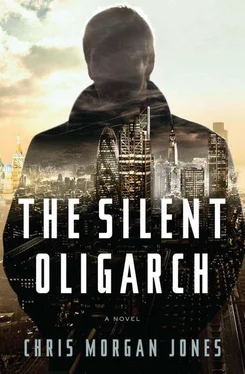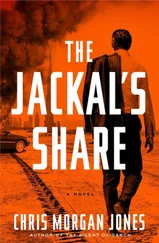“I got overexcited and blundered around. For my own benefit. I set it off.”
“Listen, I told you to go. Right? Sooner rather than later. And I won’t feel guilty if Prock turns out to be right. Which, by the way, we’ll probably never know for sure, the way these things go. And you know why? I didn’t introduce Dmitry Gerstman to Konstantin Malin. I didn’t bully him into taking a job that compromised him the moment he took it. I didn’t encourage him to think he could leave that behind. That’s what killed him.” Hammer smiled. “If, of course, that’s what killed him.”
Webster heard keys turning in the front door lock and at the same time his phone rang. Number unknown. He looked at Hammer and answered it.
“Hello,” said the voice on the other end. “This is Istvan.”
Webster put his hand over the phone, told Hammer who was calling, and left the room. He managed to smile at Mary as he passed her in the hall, and took himself into the dining room. Ten minutes later he returned to Hammer’s study and reported.
At 2:37 a.m. Dmitry Gerstman had fallen from the roof of the Hotel Gellért in Budapest and died instantly. Cause of death had not been formally established but superficial examination suggested he had been killed by the fall. He had not been staying at the Gellért but at the Four Seasons. He had checked in there on Friday morning, and was due to check out on Tuesday—he had a flight booked back to Berlin at 6:55 p.m. on that day. He appeared to have fallen from the roof itself rather than from one of the rooms, although tests to determine how far he had fallen would confirm that. Police had found no sign of any struggle at any of the points from which he could have fallen. None of the hotel staff on duty remembered seeing him enter the hotel; in fact, no one remembered seeing him in the hotel at all. Guests had not been systematically interviewed. He had left no note, but had e-mailed his wife from his BlackBerry half an hour before he died. The message had simply read, “Good-bye. I’m sorry. Dmitry.” When the German police had informed Mrs. Gerstman of her husband’s death at around 8:30 a.m. Berlin time, she had already received the message and had been trying to call him on his phone and at the Four Seasons. She had notified the German police. The BlackBerry itself had been found smashed in his inside jacket pocket. He had been wearing a suit but no coat, even though it had been a cold night.
“Why was he there?” said Hammer.
“In Budapest? That’s a little garbled. The Germans have been speaking to his wife and to Prock but I think something’s being lost in translation. He had two clients in Hungary, one in Budapest, the other in Miskolc. He had dinner with one of them on Friday but it’s not clear which one. He had meetings in his diary for Monday and Tuesday but that’s all I know.”
“And what was he doing that night?”
“They don’t know yet. They’re trying to put his movements together now. I’ve asked Istvan to keep an eye on it.”
They sat for a few moments in silence. Webster realized that, ridiculous though it was, Hammer’s conclusion was important to him. It held the promise of absolution.
“Does that sound like suicide to you?” asked Hammer.
Webster sighed. “No. No, it doesn’t. Might you e-mail your suicide note? I suppose so. The coat seems strange but if you’re going out to kill yourself maybe you don’t think about coats. I don’t know. A hotel just seems an odd place to choose. Particularly when you’re staying in another hotel. Why not just throw yourself out of your own window?”
“Maybe he’d had a bad experience at the Gellért.”
“Thanks.”
“Sorry. What about him? Was he the type?”
“He wasn’t exactly cheerful but… I don’t know. He was fit. Obviously fit. Like a serious runner or a rower or something. But more than that he seemed driven. Purposeful.”
“Depressed?”
“Not at all. He was scared about something, clearly, looking back, but not depressed. No, I’m fairly sure.”
Hammer chewed on his pencil. Then he got up, rooted around on the mantelpiece, found some matches and crouched to light the fire. It took a single match to get the rolls of newspaper burning. He stood up and watched the kindling begin to crackle and take.
“Should have done that when you arrived. Sorry. Do you want to take your coat off? No?” Sitting back in his chair he looked at the ceiling for a moment and closed his eyes. He sat like that for perhaps a minute, then looked at Webster.
“Why was it for your benefit?”
“What?”
“You said you got overexcited. What about?”
Webster looked away and watched the fire for a moment, taking off his watch and rubbing his wrist. This wasn’t something he had wanted to discuss with Ike, but he hadn’t stopped to consider why. Now he knew: it was foolish, and he felt faintly ashamed.
“It doesn’t matter.”
“Is it that article?”
Webster nodded. “It’s been hard to leave it alone.”
Hammer waited for Webster to look up. “You’re not thinking straight. You’ll never know who killed her, unless someone tells you. Was it Malin? He’s a candidate, sure. But it’s gone. It’s too long ago. You’ll never know. But on this case—you’d have seen Gerstman anyway. The job is to finish Malin, whatever he might have done ten years ago. That’s the best justice you’re ever likely to get.”
Webster held his watch in his hands and studied the second hand ticking around before putting it back on his wrist, squeezing the clasp shut and sitting back in the chair. Hammer went on.
“For what it’s worth, I’d be amazed if he killed himself. Either way you shouldn’t blame yourself, but you will, for a bit. But that’s not important. What’s important is what happens to Lock. If you put Gerstman at risk then presumably Lock is in danger too. And he’ll know that. He’ll be scared. That may be why Gerstman died. So we have a choice. Do we keep pushing Lock? Or do we leave him, even though we may be the best hope he has of a future?”
Until that moment, Webster hadn’t realized that this, of course, was where the conversation would end: with him agreeing to go on with the case or walking away from it for good. He had come here wanting to hear that Gerstman’s death was not his fault. He hadn’t even thought about his responsibility to Lock.
Hammer waited patiently for his response. I know what he wants me to say, thought Webster. Never back away. Finish what you start.
“I think we should stop work,” he said at last. Hammer, his face lit by the fire, said nothing. “I don’t want to set off any more mines. No more meddling. I think we should have known how big this was. I’m sorry.”
Webster stood up, apologized again, and left the room and Hammer’s house. Outside it was dark. He set off on the walk home, down the hill and west for two or three miles. No more meddling. This reckless campaign was over, its casualties already too great.
THAT NIGHT WEBSTER DREAMED SHORT, stark dreams that never resolved. In one, he sat with Lock in a row boat on a narrow river heavily shaded by trees. He had the oars and was rowing with a slow, regular stroke while Lock, opposite him, in a black suit and a floppy red bow tie, talked happily about his life in the South Seas, as if he were Stevenson or Gauguin. Then Lock’s face tensed and he gripped the sides of the boat; Webster felt himself tipping backward as the river fell sharply downward behind him. When he woke the back of his head was wet with sweat.
AFTER GERSTMAN’S DEATH Lock’s imagination began to work again. It had never been energetic but at some point, in Russia, without his noticing, it had simply switched off. He had never really needed it, nor missed it, but when he found out what had happened to Dmitry Gerstman it came irresistibly back to life, resist though he might.
Читать дальше












